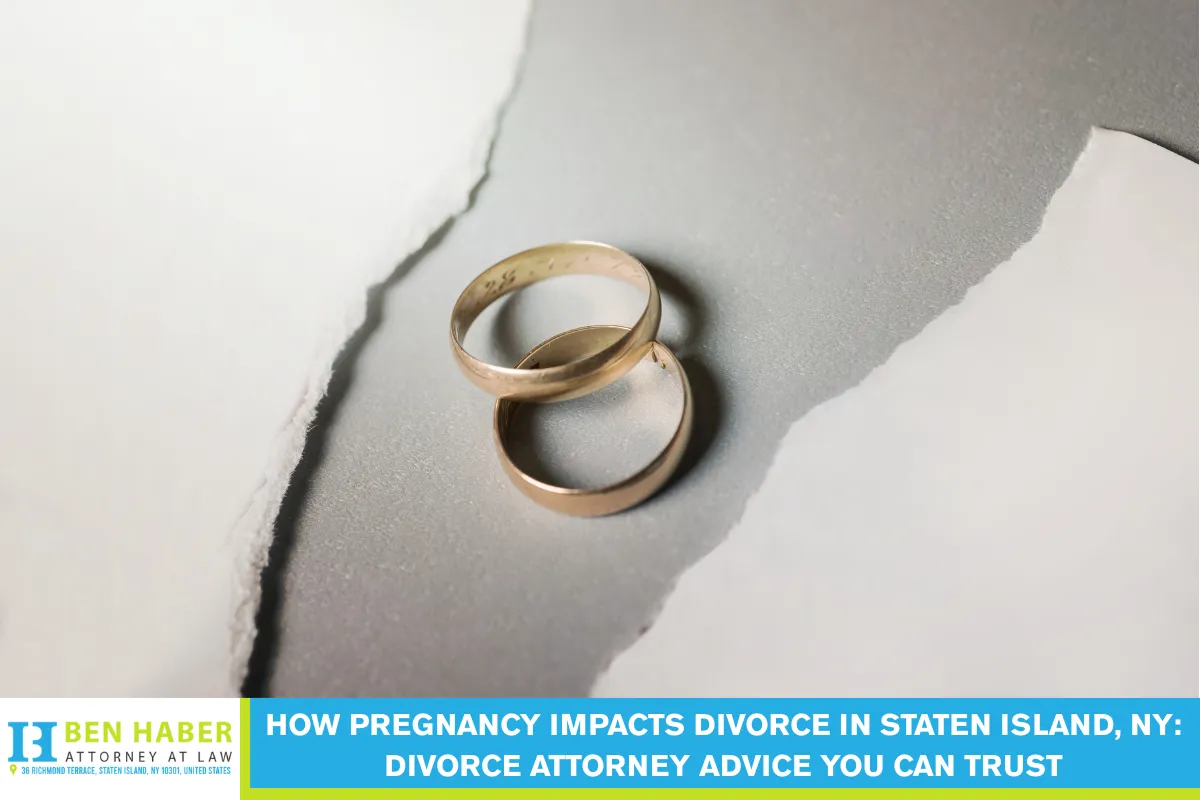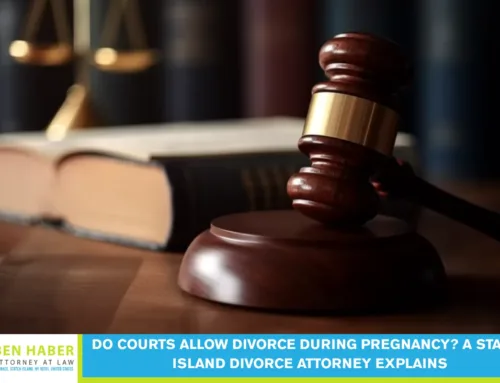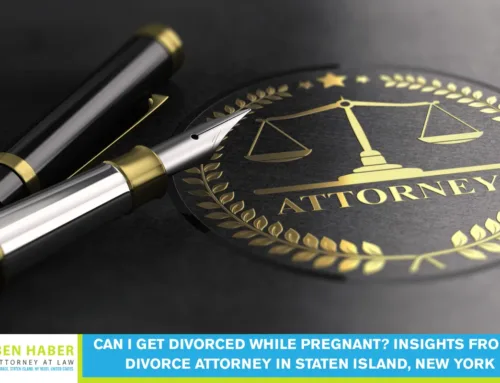A divorce attorney can play a major role in helping individuals understand their rights and responsibilities during divorce, especially when pregnancy is involved. In Staten Island, this situation presents unique challenges that require both legal awareness and emotional preparedness. Expecting a child changes the landscape of divorce proceedings significantly, from establishing paternity to determining financial obligations and future custody.
The combination of divorce and pregnancy isn’t just a legal issue—it’s a deeply personal and often emotional transition. Understanding how the laws work in Staten Island helps individuals make informed choices for themselves and their children during this challenging time. This article explains how pregnancy can impact the divorce process, outlines relevant New York legal standards, and provides guidance on navigating each stage effectively.
Understanding Divorce in Staten Island: What the Law Says

In Staten Island, divorce falls under the same general laws as the rest of New York State. However, local court tendencies, delays, and procedures can differ slightly from borough to borough. Knowing these foundational divorce principles helps set the stage before exploring how pregnancy adds another layer of complexity.
New York is a no-fault divorce state, which means that one spouse can file for divorce simply by stating that the marriage has broken down irretrievably for at least six months. There’s no need to prove adultery, abuse, or abandonment.
To file for divorce in Staten Island, at least one spouse must meet New York’s residency requirement, typically meaning they’ve lived in the state for at least one continuous year. Once filed, the case proceeds through Staten Island’s Supreme Court, where decisions are made regarding property, children, and finances.
When pregnancy becomes part of the situation, however, even the simplest divorce case can be paused or extended, depending on what issues still need to be resolved.
How Pregnancy Changes the Divorce Timeline

Pregnancy can delay the completion of a divorce in Staten Island due to several practical and legal reasons. Courts generally want clarity around matters related to children before finalizing any decisions, and that’s often impossible until the child is born.
In most cases, judges are reluctant to finalize a divorce. At the same time, one party is pregnant, especially if the legal paternity of the child has not yet been established. In other words, the court wants to ensure it knows who the legal father is before making decisions regarding custody, support, and parental rights.
Some judges may even postpone hearings or deny final judgment until after the birth, to ensure that all necessary legal issues involving the child are addressed appropriately. The goal is to prevent future complications, such as custody disputes or support orders that may need to be amended shortly after the divorce is finalized.
While this can be frustrating for the spouses involved, especially when one wants to move on quickly, the court’s priority is to protect the child’s welfare. That takes precedence over convenience.
Establishing Paternity: Why It Matters in Pregnancy-Related Divorce
Establishing paternity is a central legal concern in any pregnancy-related divorce case. In New York, if a child is born while the couple is still legally married, the husband is presumed to be the legal father, regardless of whether or not he is biologically related to the baby.
This automatic assumption can lead to legal complications:
- Suppose the pregnant spouse claims that someone else is the biological father. In that case, legal steps must be taken to challenge the presumption.
- DNA testing may be ordered by the court to determine actual paternity.
- Without officially disputing paternity, the legal spouse could end up financially responsible for the child.
A divorce attorney can help initiate the proper legal process for establishing or denying paternity, depending on the situation. These steps are not optional—they’re essential in ensuring that custody, child support, and parenting rights are assigned correctly.
Financial Support During and After Pregnancy

Pregnancy often brings financial challenges, and divorce can add even more pressure. In Staten Island, the law recognizes that expecting mothers may need additional support, especially if they are not currently working or are experiencing health issues that prevent them from working.
Several types of financial support may apply:
Temporary Spousal Support
The court may award temporary spousal support (also known as maintenance) while the divorce is pending. This ensures the lower-earning spouse has access to funds for basic needs during pregnancy and the divorce process.
Anticipated Child Support
Though official child support orders typically begin after the child is born, courts can consider future needs. Some divorce attorneys help draft agreements that outline how expenses will be handled once the baby arrives, ensuring there’s a plan in place even before the birth.
Health Insurance and Medical Bills
Health insurance coverage is another major concern. Suppose the pregnant spouse is covered under the other spouse’s health plan. In that case, it’s possible to remain on that policy until the divorce is finalized. Courts often require that medical expenses related to pregnancy, labor, and delivery be shared or paid by the higher-earning spouse.
These decisions are never automatic. They must be requested through formal legal motions, backed by financial disclosures and supporting evidence. This is one area where having an experienced divorce attorney in Staten Island makes a real difference.
How Custody Planning Works Before and After Birth

Although a baby hasn’t yet been born, custody still becomes part of the conversation during a divorce involving pregnancy. Courts in Staten Island cannot make final decisions about custody and visitation before a child is born. Still, they can begin addressing expectations and planning.
Custody in New York is always based on what the court believes is in the best interests of the child.
That includes evaluating factors such as:
- The physical and mental health of both parents
- Each parent’s ability to provide a stable environment
- History of domestic violence or neglect
- Willingness of each parent to cooperate with the other
After the child is born, the court will revisit the situation and issue a final order regarding physical and legal custody. Parents may share custody, or one parent may be awarded primary custody with the other receiving visitation rights.
Pregnancy often complicates these plans. For instance, one parent may want sole custody from the outset, or the non-pregnant spouse may worry about being excluded from the child’s life. Early legal guidance helps prevent conflict and miscommunication.
Emotional and Physical Challenges Pregnant Individuals Face During Divorce
Divorcing while pregnant creates a perfect storm of emotional and physical challenges. Beyond the legal system, many individuals experience anxiety, depression, or fear about their future as single parents. The stress of court hearings, financial concerns, and uncertainty about the outcome can also affect the health of the pregnancy.
Common emotional and physical concerns include:
- Hormonal changes that heighten emotional reactions
- Worry over finances and how to raise the baby alone
- Loss of emotional support from the former partner
- Stress-related complications that could affect delivery
Seeking emotional support from counselors, therapists, or support groups in Staten Island can be extremely beneficial. So, it’s essential to have a divorce attorney who understands not just the law but also the human side of the situation. Legal clarity helps reduce stress, which ultimately benefits both the parent and the unborn child.
Legal Tips for Navigating Divorce While Pregnant in Staten Island

Get Legal Advice Early
The earlier a divorce attorney is involved, the more options you’ll have. Delays can create more complications later on, especially with court timelines.
Keep Communication Documented
If you’re still in contact with your spouse, keep records of all conversations. This protects you in the event of disputes regarding support or parenting in the future.
Request Temporary Support
Request temporary support or assistance with medical bills from the court if necessary. Don’t wait until you’re financially strained.
Plan for Custody Discussions Now
Even if final decisions can’t be made until the baby is born, start planning early. A proposed parenting agreement shows responsibility and intent.
Avoid Verbal Agreements
Get everything in writing. Verbal promises regarding money, visitation, or medical assistance are often difficult to enforce.
Common Legal Misconceptions in Staten Island Divorce Cases Involving Pregnancy

Misconception #1: “You can’t get divorced while pregnant.”
This is false. You can file and proceed with a divorce while pregnant, though the court may delay the final judgment until after the birth.
Misconception #2: “Paternity is always assumed correctly.”
The court assumes that the husband is the father if the baby is born during the marriage, but that assumption can be legally challenged.
Misconception #3: “You won’t get any financial help before the child is born.”
Courts can award temporary spousal support, and informal plans for post-birth support may be legally documented.
Misconception #4: “Custody can’t be discussed until after the baby is born.”
While final custody orders are typically not in place until after birth, discussions, negotiations, and temporary agreements can begin before delivery.
Preparing for the Road Ahead
Pregnancy and divorce each bring their own set of challenges. Together, they can feel overwhelming, but you don’t have to face them without a plan. Understanding the legal processes in Staten Island, from paternity laws to financial support and custody planning, enables you to make informed choices at every step.
By preparing early and staying organized, you can protect your rights, your child’s future, and your peace of mind. The key is to stay proactive, avoid assumptions, and seek the right legal help before issues escalate into emergencies.
Staten Island Divorce Attorney – Benjamin Haber

If you’re dealing with divorce during pregnancy, you need real answers and a reliable guide. The Law Office of Benjamin Haber offers clear and compassionate legal assistance in Staten Island. With years of experience handling complicated family matters, we know how to manage the details and protect what matters most to you. Our in-depth knowledge of local courts, judges, and procedures ensures you receive tailored advice that is effective. Whether you’re separating from a spouse while expecting, or already in the middle of a case, we’re ready to help you move forward.
Contact us today at (718) 442-0960 to discuss your case and learn how we can help you protect your future.
Frequently Asked Questions About Divorce and Pregnancy in Staten Island, NY
1. What happens to child custody and parenting plans if the baby isn’t born yet during the divorce process?
When expectant parents are in the middle of filing for divorce, child custody becomes a more complex issue. Since the child hasn’t been born, no physical custody arrangements can be finalized. However, courts in Staten Island can still begin drafting a preliminary parenting plan. These early discussions help define each parent’s role and establish temporary parental responsibilities, such as who will handle prenatal care or attend appointments.
Judges consider the child’s best interests even before the child is born. Factors like stability, mental health, and the living environment of both parents play a role. Once the child is born, court decisions regarding custody agreements are revisited and finalized based on the baby’s needs. A family law attorney can help you prepare legal documents early and set expectations, reducing future conflict. Having a plan in place demonstrates responsibility and can positively influence custody outcomes once the child is legally recognized.
2. Is a paternity test required during divorce if the pregnant spouse claims the child belongs to someone else?
Yes, if paternity is in question during a divorce, the court may order a DNA test to establish legal fatherhood. In Staten Island, if a woman is pregnant while married, the husband is automatically presumed to be the legal father unless a paternity claim is filed challenging that assumption. This presumption can lead to legal obligations, such as child support payments, even if the husband isn’t biologically related.
Filing a paternity claim early allows the court to consider whether a paternity test is necessary before finalizing a divorce settlement. These legal complexities can significantly affect custody agreements and support payments later. Once DNA tests confirm or disprove biological ties, legal recognition of the child’s father is adjusted in the legal paperwork accordingly.
It’s vital to involve a family law attorney to help navigate this sensitive matter. Legal guidance ensures that your rights are protected while prioritizing the child’s best interests.
3. Can support payments be requested before the child is born in a Staten Island divorce?
While child support payments usually begin after the baby is born, courts in Staten Island can order temporary support payments during pregnancy under spousal maintenance provisions. This is especially important if the expectant parent is not working or is on maternity leave. These temporary orders can help cover prenatal care, housing, and essential living expenses while the divorce is pending.
A divorce attorney can help you file a motion requesting financial assistance during this time. These payments are not classified as traditional child support but fall under spousal support. Once the child is born, the court will reassess and issue a formal child support order based on income, custody arrangements, and parenting responsibilities.
Support payments help maintain stability for the pregnant spouse and ensure proper healthcare and well-being for the unborn child. It’s critical to document all expenses and provide evidence to the court when requesting temporary assistance.
4. What legal rights does a non-custodial parent have after the child is born post-divorce?
Once a divorce is finalized and the child is born, the non-custodial parent has legal rights that are outlined in the custody agreement and parenting plan. These rights typically include visitation, shared decision-making responsibilities, and access to the child’s educational and medical records.
In Staten Island, family law prioritizes the child’s best interests, ensuring that both parents maintain a meaningful relationship with the child, unless one parent poses a safety risk. A family law attorney can help the non-custodial parent request specific terms in the divorce settlement, including holiday schedules and consistent parenting time.
If paternity is questioned, legal recognition must be established first through court-approved DNA tests or voluntary acknowledgment. Once confirmed, the parent is entitled to enforceable rights and responsibilities, including contributing to child support. Maintaining open communication and following court orders is essential to preserving your rights and building a strong post-divorce support system for the child.
5. How can expectant parents legally protect their rights during divorce in Staten Island?
Expectant parents going through divorce in Staten Island should begin by securing representation from a qualified divorce attorney who understands family law. Legal complexities increase when pregnancy is involved, so proactive steps are essential. One of the first actions to take is drafting legal agreements that address temporary custody planning, healthcare access, and financial support during the pregnancy.
It’s also essential to establish a paper trail by organizing all relevant legal documents, including health insurance coverage, prenatal expenses, and housing agreements. If there’s uncertainty about paternity, filing for a paternity test early on will prevent complications later. A custody agreement can’t be finalized until after birth, but both parties can begin preparing a mutually agreeable parenting plan.
Having a support network—including a family law attorney, healthcare providers, and family advocates—helps reduce stress and ensures that decisions are made in the best interest of both parents and children. Proper legal planning now avoids court delays and conflicts after birth.
Read more: Do Courts Allow Divorce During Pregnancy? A Staten Island Divorce Attorney Explains






